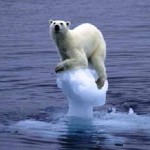
NGO challenges Canada's claim bears are not "endangered."
by SGNews staff
MONTRÉAL, November 30 — The Center for Biological Diversity’s petition challenging Canada’s failure to protect polar bears will move forward under the North American Free Trade Agreement’s environmental dispute process. The Commission for Environmental Cooperation, an entity established under NAFTA, announced today that the Center’s petition provides sufficient documentation of Canada’s violations of its own laws to warrant an official response from the country’s government.
The Center’s petition challenges the Canadian government’s 2011 decision denying polar bears “threatened” or “endangered” status under Canada’s Species at Risk Act. Instead, Canada designated the bears as a “species of special concern,” which provides no substantive protections. Canada’s listing conflicts with the 2008 United States decision to list polar bears as threatened under the US Endangered Species Act because of ongoing and projected population declines from climate change.
Canada refuses to recognize the threat global warming poses to the species, specifically ignoring climate impacts on the species when making the “special concern” decision last year.
“Climate change threatens to wipe polar bears off the map, but Canada continues to shrug off their plight,” said Center attorney Sarah Uhlemann. “Canada’s home to the majority of the world’s polar bears, and as such it has a duty to lead efforts to protect the species — not be the greatest obstacle to their protection. I'm hoping this finding helps push the country to recognize the serious threats facing polar bears and act to protect them.”
Scientists predict that more than two-thirds of the world’s polar bears will disappear by 2050 because of climate change, which is melting the sea ice they depend on to survive. Some populations, like the famed Western Hudson Bay population near Churchill, have already suffered serious declines. Yet Canada refuses to recognize the threat global warming poses to the species, specifically ignoring climate impacts on the species when making the “special concern” decision last year.
Some populations, like the famed Western Hudson Bay population near Churchill, have already suffered serious declines.
Canada now has until January 23, 2013, to provide an official response to the Commission for Environmental Cooperation.
Separately, in January 2012 the Center filed a formal request with the US government seeking trade sanctions against Canada for approving unsustainable hunting quotas for Hudson Bay polar bears over the objections of polar bear scientists — and in violation of the 1973 Agreement for the Conservation of Polar Bears, a treaty signed by both Canada and the United States. More than 600 polar bears are killed in Canada each year, including through sport hunting, and about half of those bears are later exported as skins and rugs, primarily to Asia.
While the United States has yet to act on the Center’s sanctions request, the American government has, with Russian support, proposed a ban on the international trade in polar bear parts under the CITES convention, a treaty that protects imperiled species from harm caused by international trade. A decision on the trade ban will be made at a March 2013 CITES meeting.
At the Center for Biological Diversity, we believe that the welfare of human beings is deeply linked to nature — to the existence in our world of a vast diversity of wild animals and plants. Because diversity has intrinsic value, and because its loss impoverishes society, we work to secure a future for all species, great and small, hovering on the brink of extinction. We do so through science, law, and creative media, with a focus on protecting the lands, waters, and climate that species need to survive.
© Copyright 2012 SGNews Staff, All rights Reserved. Written For: StraightGoods.ca
Sorry, the comment form is closed at this time.